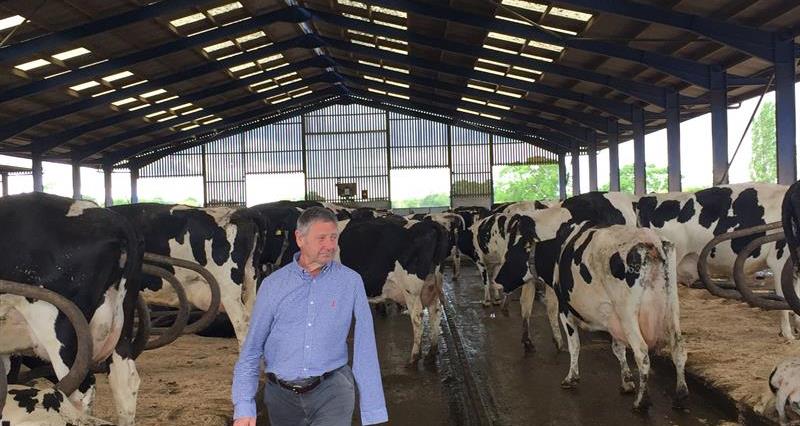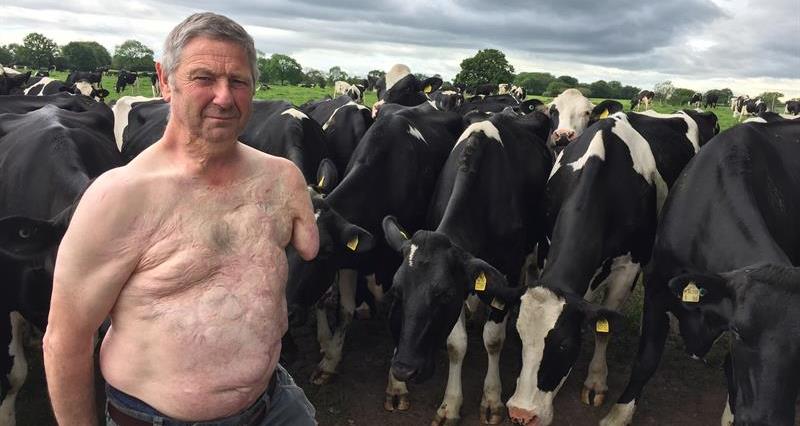- NFU members save 10% on PTO guards from Agriline. View the discount.
- Want to know more about PTO guard safety? Read our short guidance
Struggling to switch the machine off using the cord, he jumps off the tractor to see what’s wrong. Tassels on the clothing he’s wearing blow in the wind. Within seconds one of the tassels is blown towards an unguarded and damaged power take off shaft (PTO) and wraps around it. The guard was cracked and pieces were missing.
It’s a split second in time that changed Kit’s life forever.
Kit recalls: “I was pulled in by the tassels and I put out my arm instinctively. It was like being hit by a prop forward in rugby. My arm was broken to bits and wrapped around the shaft. Then the PTO started cutting into the side of my body, the friction burning at my clothes and then my skin.
“I lay in the field in shock. What was left of my arm was hanging on by a piece of skin and my only thought at the time was I’ll not be able to play rugby tomorrow.
“I made my way for help to a nearby cottage owned by people my family had known for years. The old woman opened the door and said ‘my God’ before slamming the door in my face. Her husband then came to the door and asked who I was. Even though they’d known me all my life, they didn’t recognise me. It was then that I realised my injuries were serious.
“I was taken by the flying squad to Whiston Hospital and that is all I remember from the day. I was put on LSD for 10 days but all I dreamt about was a tennis ball hitting me. I was later told that was probably the sound of my ventilator.”
From intensive care, Kit was moved onto the burns unit. He was highly susceptible to infection and had to be knocked out daily to have his bandages changed because the pain was so bad.

“There was me and a young girl who had been involved in a car crash on the unit. I could hear her screams and she could hear mine.
“I think my mother suffered more than anybody. She never slept for two months after the accident. She had to endure hearing me screaming in my sleep.
“An accident is an accident. Nobody purposefully went out to inflict this upon me. I was a farm worker and this was one of the risks. However, the effects it has on the people who love you are catastrophic.
“My elder brother signed the form agreeing to amputate what was left of the arm. Oil and cow muck would have inevitably gotten into the wound so I was susceptible to serious infection.
“I’m only alive because of the quick thinking and care of the medical professionals who helped me. When I first arrived in intensive care a nurse had to slit my throat and perform a tracheotomy. Then a doctor lay beside me and gave me a transfusion using his own blood.”
Kit left hospital after six months and is convinced the only reason he was allowed to leave is because his weight dropped to a mere four and a half stone and he needed to be fattened up before skin grafts could begin. Kit continued to endure skin grafts for five years following the accident.
Kit says: “I wouldn’t eat so the hospital staff would bring me take-away meals out of their own pockets. Friends visited but only one came back a second time. They later admitted none of them could cope with the smell of burning skin.”
A young lad Kit was as fit as a fiddle at the time of the accident. He played first class rugby and ran five miles every night after work. He also had a girlfriend who he told soon after to leave and get a life.
Unable to watch his beloved game of rugby as it would have broken his heart at no longer being able to play, he was eventually persuaded to compete in tug of war for Roberts Bakery at the very highest level.
Kit says: “Competing in tug of war allowed me to meet loads of people and nobody judged me. I would probably have killed myself otherwise.
“I cannot believe what injuries I suffered. I was terrified the day I came out of hospital but within a day I’d revisited the farm and within a month I was back on a tractor. The accident was not going to beat me.
“I still get frustrated by the many things I cannot do. Things like wiring a plug, tying my own shoe laces or doing up my cuffs.”
Kit’s employer, Richard Latham, was prosecuted and Kit received just £75,000 from a sole insurance policy. However, Kit never held anything against Mr Latham and has continued to work for the family ever since.
PTO guard safety
It is important to consider the safety of this piece of equipment.
Power Take Offs (PTOs) are a useful tool on a tractor to power many other pieces of equipment vital to farming through a PTO shaft. The guard on PTO shafts may seem like a simple piece of plastic, but it is far more than this, and the lack of one on a PTO shaft can result in life-changing or fatal injuries. Under the Provision and Use of Work Equipment Regulations 1998, all equipment and machinery used for work must be accompanied by appropriate health and safety measures. When specifically considering PTO shafts, the appropriate health and safety measure is an effective guard to ensure compliance with these regulations.
Maintenance
PTO guards are specifically designed to fit and function with specific sizes of shafts, as such it is important that the guard is suitable for the shaft, to ensure it protects it effectively. All PTO guards are rigorously tested prior to being made publicly available to ensure they are effective in protecting the shaft and keeping any operators safe. PTO shafts need regular greasing, choosing a guard type that allows for easy greasing of the shaft can help reduce the need to manipulate or remove the guard, therefore decreasing the risk of damaging the guard. Even a small amount of damage can affect the effectiveness of the guard, as such, it is important to replace it as soon as damage is identified.
PTO shafts should never be operated without a suitable and effective guard in place, as the smallest item catching the rotating shaft can result in lethal circumstances. To understand the level of risk associated with PTO shafts, . While this incident may have occurred in 1975, that does not mean that it is any less relevant today. The industry is still seeing the impacts of damaged or a lack of guards on PTO shafts, something which should be a thing of the past.

